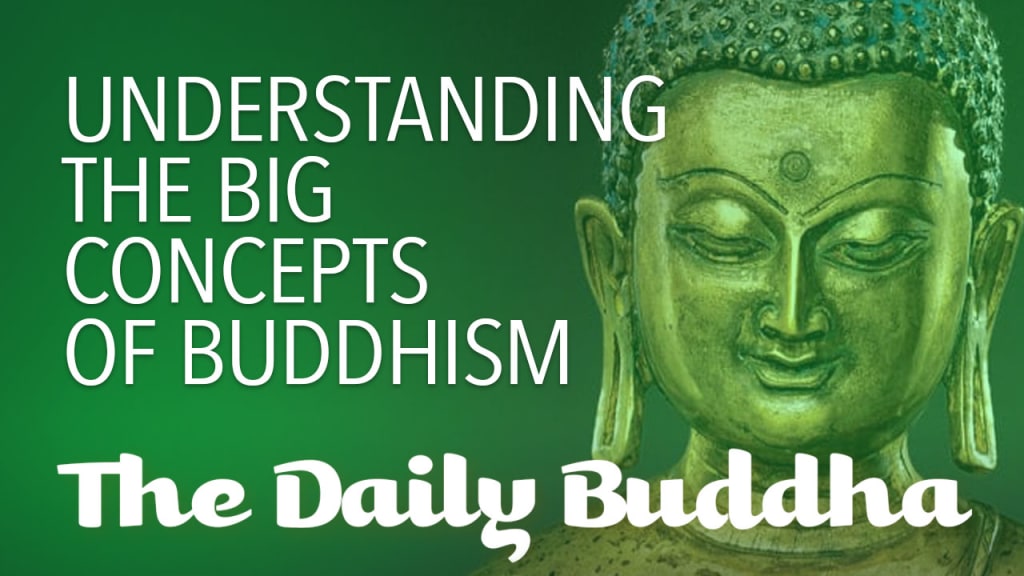
We can all benefit from understanding the big concepts of Buddhism.
The historical Buddha (born Siddhartha Gautama) was a teacher, philosopher, and spiritual leader. He wished for all to understand the concepts of Buddhism, as the religion is based off his teachings.
We will look at two core Buddhist teachings that can be applied to your life – The Four Noble Truths and the Eightfold Path. This is simply an introduction to the concepts. It can take years to fully understand each aspect of these teachings.
Buddhism teaches the concept of samsara, which means a cycle of birth, death, and rebirth. Buddhists believe we repeat this cycle over and over until we become enlightened. Think of it like this – Earth is a school and we come back year after year to learn until we finally graduate, meaning we reach Nirvana. Even if you struggle to accept the concept of multiple lives, you can still benefit greatly from the teachings of Buddhism. You’ll begin to understand how much of our suffering is self-inflicted based on how we see the world. And you will start to wake up to a different reality – one that is filled with love, compassion, and inner peace.
The Four Noble Truths are often misunderstood because they are looked at on a very superficial level. On the surface, they state that life is suffering, we suffer because of our greed, we will stop suffering when we stop wanting, and we do that by following the Eightfold Path. But really, each Truth refers to a deeper part of our psyche.
The Truth of Suffering - Simply put, the First Noble Truth states that life without understanding is suffering.
The Truth of the Cause of Suffering - The cause of our suffering is basically our attachment to our desires. The term desire here extends much further than wanting clothes, cars, or money. We are attached to ideas of how we think life should be, how others should be, what will make us happy, and on and on.
The Truth of the End of Suffering - This truth states that an end to suffering is possible and Buddhism teaches that we do that by letting go. Unfortunately, this can’t be done with an act of will. Instead, it is a more complicated process of seeing and understanding the true nature of reality.
The Truth of the Path that Frees Us from Suffering - The Fourth Noble Truth lays out a path – The Eightfold Path – to reach enlightenment.
The Eightfold Path is a way of life lived in every single moment, every single thought, and every single action. It is not a lesson that you sit down to study and practice each morning. They all build off each other and depend on each other.
Right view - Having the right view means understanding the true meaning of life and why we are all here, which is to reach enlightenment.
Right intention - Every action begins with a thought. That thought is our intention and the intention is either reinforcing our attachments or starting to let them go.
Right speech - Buddhism teaches compassion and loving kindness. Right speech involves speaking kindly to each other, but also to ourselves.
Right conduct - Our thoughts, speech, and actions should all be in harmony. When we take a compassionate view towards others and ourselves, our actions should easily follow.
Right livelihood - Our lifestyle should reflect the work we’ve done to correct our thoughts, actions, and speech. This refers to both how we make a living and how we live our daily lives.
Right efforts - This is self-work, self-care, and self-love. We should be working on ourselves instead of trying to change others. We want to cultivate more generosity, compassion, and loving kindness, while letting go of anger, greed, and hatred.
Right mindfulness - This is full body and mind awareness. Living in the present and seeing our thoughts and emotions for what they truly are – impermanent. When we are mindful, we do not get swept up in anger or hurt. We see and understand that all emotions are fleeting, and we do not let them dictate our actions.
Right concentration - This is usually viewed as meditation. Meditation helps the mind with every step of the Eightfold Path. We must be aware of our thoughts and intentions in order to change our actions. And we must create space between ourselves and our thoughts and emotions so we don’t get lost in them. This is accomplished through meditation.
This Introduction to the core of Buddhism Is Just the Beginning. We can start with a basic understanding that life involves suffering. There is pain, everything is impermanent, and everything is connected. And what we strive to understand and wake up to is that everything is a lesson and an opportunity to better understand ourselves and the purpose of our existence.
Peace and Love, Jim






Comments
There are no comments for this story
Be the first to respond and start the conversation.